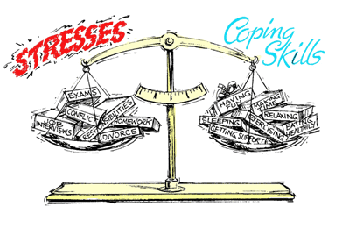How to Handle Stress as a High School Student

March 31, 2017
Being a teenager is stressful enough as it is, but try adding high school into the mix, and suddenly life becomes a hundred times harder. A student must go through long school hours listening to teachers lecturing about this and that, while being cooped up in a desk for almost an hour. Then when school is finally over for the day, there are assignments, responsibilities and other after school activities that the student must worry about. Having to deal with this scenario everyday can be very tolling on a young adult’s brain. In fact, studies have shown that teens are in fact more stressed than adults. And some stress can be good, but having too much stress can be detrimental for a person’s health. So here are a few steps to help reduce stress as a high school student.
- Find peace and quiet
It’s important for a student to find time for her/himself where he/she can just sit in peace and quiet for a short while and relax. Especially, since, for most of the day, a student spends his/her time being surrounded by other loud and rambunctious teens which can induce headaches and other feelings of anxiety when it becomes too much for the student to handle everyday. According to psychologist Robbie Maller Hartman, Phd., a Chicago health and wellness coach, “Research suggests that daily meditation may alter the brain’s neural pathways, making you more resilient to stress.” So a person just needs to simply sit down in a quiet room for a few minutes, while closing his/her eyes, breathing deeply and emptying his/her mind, and that alone will help to relieve an insurmountable amount of stress.
2. Do something enjoyable
It is recommended that each person has some sort of hobby or activity that he/she enjoys doing such as drawing, reading, or playing sport. Not only will it provide a fun alternative in times of boredom, but doing something enjoyable will also help a person feel less stressed. The main reason is that it gives a person’s brain a break from the feelings of anxiety and tension as the person is focused on doing something completely different. It gives a person an outlet and a way to feel relaxed and happy while doing something he/she enjoys.
3. Talk to someone
Sometimes all a person needs to feel less tense and stressed is to find a way to let all of that stress out. The most healthy way of doing so is by talking to someone such as a parent, friend, or anyone else that is trusted. Usually stress is caused by some sort of problem, and typically for teens, it’s school. Being able to discuss that problem with someone else will provide a lot of benefits. Not only will it help the person have an outlet for his/her stress, but having someone else to discuss the problem with will sometimes help with shining light on the situation and looking at it from a different point of view. This way, the person can now find the positives in what was previously a dreadful situation. Sharing the burden will also help to lighten the load of stress on a student’s shoulders. So it is often times highly recommended, even by professional psychiatrists, that people share their problems, even the small ones.
4. Avoid negative thinking
Having negative thoughts is one of the most common triggers for stress not just for teens, but also for adults. This is caused by over-excessive worrying about a specific situation such as an interview or a particularly difficult assignment, which will lead to the release of stress hormones within the body. So in order to stop this from happening it’s best that a person takes a step back and tries to avoid thinking about the situation. Because if a person has already done all they could to ensure that nothing but good results will come out of whatever happens, then there is no need to worry too much as the person had already done all he/she could. So, whatever ends up happening in the end was never anything that the person could have controlled and/or predicted, no matter if it was negative or positive.
5. Avoid unorganized messes and other triggers of unnecessary stress
Unorganized messes are also another thing to avoid, as they too will cause unnecessary stress, especially for people who are usually fairly organized on a daily basis. Having papers scattered around, clothes off hangers, school supplies in a mess, and so on will cause a person to become frazzled, and he/she may not be able to think straight. This is because when a person sees items strewn about precariously, the person will feel like he/she does not know where anything is, and it will cause him/her to become lost even in his/her own room. The person will start worrying about misplacing certain items or losing other ones, and the brain’s natural response is to induce anxiety and stress hormones into the person system. So being organized and placing items where they belong will definitely help to lessen the risk of that happening.
Either way, different people will have different triggers for unnecessary stress. So as a result, it is up to the person to figure what those triggers are and to try to avoid them or resolve them as quickly as possible. And high school students especially, despite how hard it may be at times, need to put in a little more effort to relax and a little less effort to worry.










